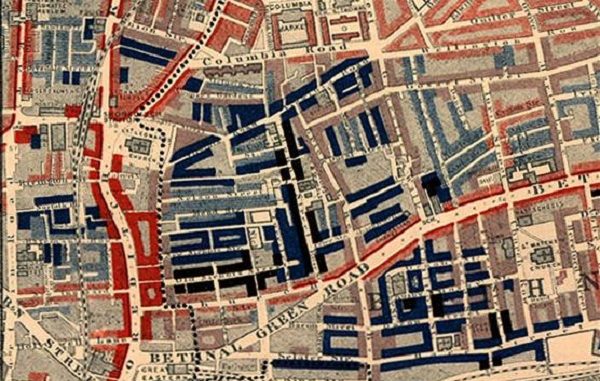
Continuing our series of articles to mark the 200th anniversary of the birth of Friedrich Engels, Helen Pattison looks at one of his first works, The Condition of the Working Class in England.
“Insufficient satisfaction of the vital needs is what prepares the frame for contagion and epidemic”, states Friedrich Engels’ book, The Condition of the Working Class in England. It might be confusing language, but it’s extremely eye-opening.
In a book written all the way back in 1845, the link is made between the poor living standards of the working class, poor health, and the easy spread of sickness and disease. Cholera, typhus, and smallpox repeatedly flared up in towns and cities.
A fever ravages through London thanks, in part, to “ill-built, ill-kept streets”. Who would have thought such a book would hit so close to home today?
Another similarity is the discussion on air pollution. There is lots of talk today about levels of air pollution in big cities, but Engels was writing on the same subject over 170 years ago, and especially the impact on children’s health.
These consequences of capitalism are not new. They continue to have a very real impact on people’s health – the worst is faced by the poorest in society.
Differences today
There are clearly big differences between how most working-class people in Britain lived in the 19th century compared to today. Huge numbers of people without shoes, houses without furniture, piles of hay in the corner to act as a bed for whole families, families forced to break up chairs for fires to keep warm.
Sewage lined the streets and people ate rotting meat or starved. Extremely limited, if any, access to healthcare meant people died from preventable illnesses. Many children died before their first birthday.
Even by the 1895 edition of the book, working-class conditions had changed drastically. Over the following decades, technological, economic, and medical development – combined with the willingness of the working class to struggle – pulled people out of these conditions, in the main.
Sick pay, the NHS, weekends, and the welfare state were either won through battles with the bosses and government or were granted through fear of mass revolt.
But extreme poverty hasn’t been eradicated, even in the richest economies in the world. Billions of people live in appalling conditions globally. One in three people does not have access to safe drinking water.
Horrific cases such as Mercy Baguma starving to death in her Glasgow home, with her malnourished baby beside her, should not happen. In 2018, 600 homeless people died on the streets.
Since 2010, cuts to health and social care have been linked to 120,000 deaths. On top of that, we have had the pandemic – where the poorest areas have seen the highest death rates.
Engels said: “The fury of the plague has fallen almost exclusively on the working class”, and the same is true today. Keyworkers, such as bus drivers, have seen deaths around three times the average.
Alongside poor living standards and overcrowding allowing disease to flourish, Engels assesses in detail the long-term health impact of poverty wages. The impact on people’s height, development and health are all covered.
Many people couldn’t work much past 45, because they worked such long hours on a poor diet. From the East End of London to northern towns, squalid living conditions are exposed.
There was so much sickness and disease that ‘sanitary police’ were introduced. But even if they closed and cleaned possible areas of the outbreak, it couldn’t solve the huge problems of poverty, overcrowding and lack of healthcare.
Compiled by Engels when he was just 24 years old, the book doesn’t read as a manifesto. This work is a thorough catalogue of the poverty that existed at the time, rather than a programme for workers to organise around.
Engels’ programme
Of course, Engels still points to the wealth and resources that could be used to alleviate poverty. Condemning the “social murder” committed by the ruling class – allowing workers to live in such poverty while the rich get richer – he said that the only real solution is to “surrender the administration of the common interests to the labouring class”.
There could have been several reasons Engels thought this intense study of the living conditions in Britain would be useful. The industrial revolution produced a classic example of the development of industry and a growing working class, which Engels highlights.
This book exposed the dire living conditions of working people in the most advanced capitalist country at that time. It’s a lesson for the working class that a struggle against capitalism is needed to change our living conditions.
Engels was utterly disgusted at the conditions people were being forced to live and totally inspired by the resilience and solidarity of working-class people.
Special financial appeal to all readers of socialistworld.net |
Support building alternative socialist media Socialistworld.net provides a unique analysis and perspective of world events. Socialistworld.net also plays a crucial role in building the struggle for socialism across all continents. Capitalism has failed! Assist us to build the fight-back and prepare for the stormy period of class struggles ahead. Please make a donation to help us reach more readers and to widen our socialist campaigning work across the world. |
Donate via Paypal |
| M | T | W | T | F | S | S |
|---|---|---|---|---|---|---|
| 1 | 2 | 3 | 4 | 5 | 6 | |
| 7 | 8 | 9 | 10 | 11 | 12 | 13 |
| 14 | 15 | 16 | 17 | 18 | 19 | 20 |
| 21 | 22 | 23 | 24 | 25 | 26 | 27 |
| 28 | 29 | 30 | 31 | |||

